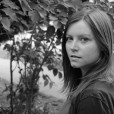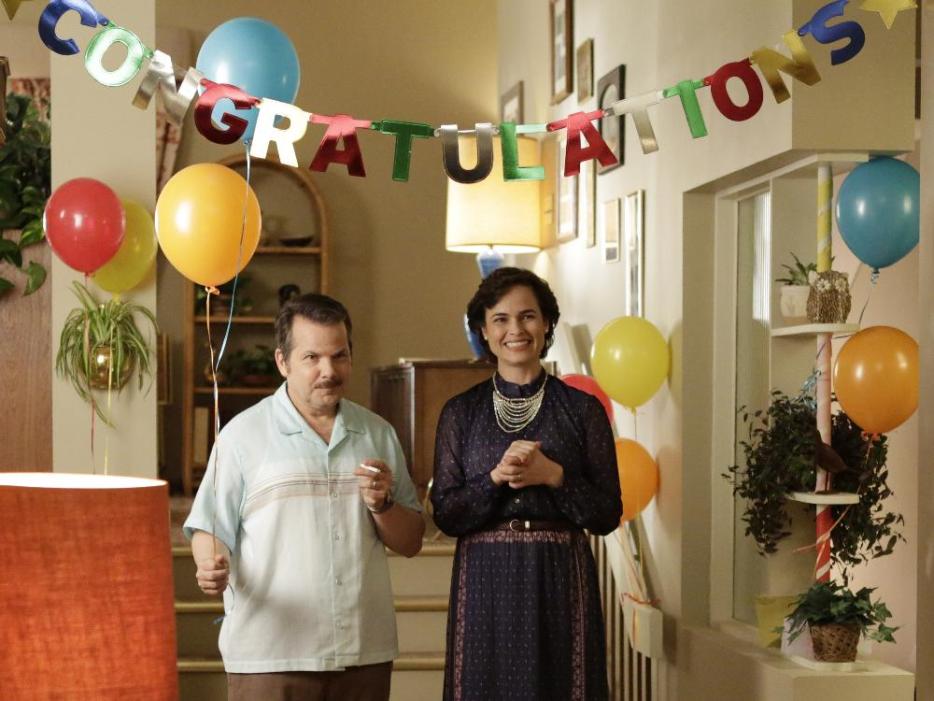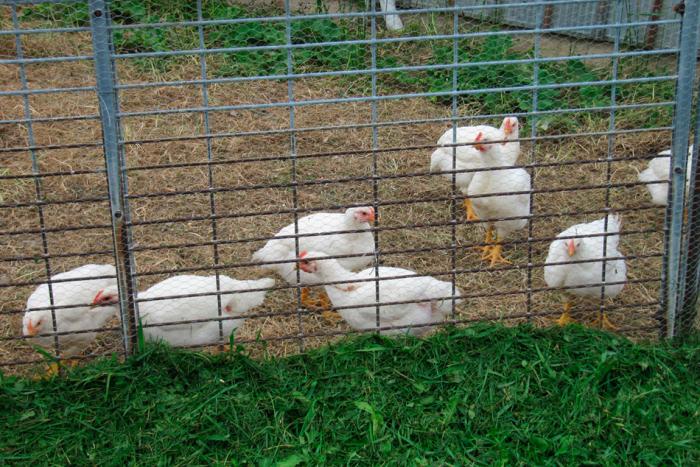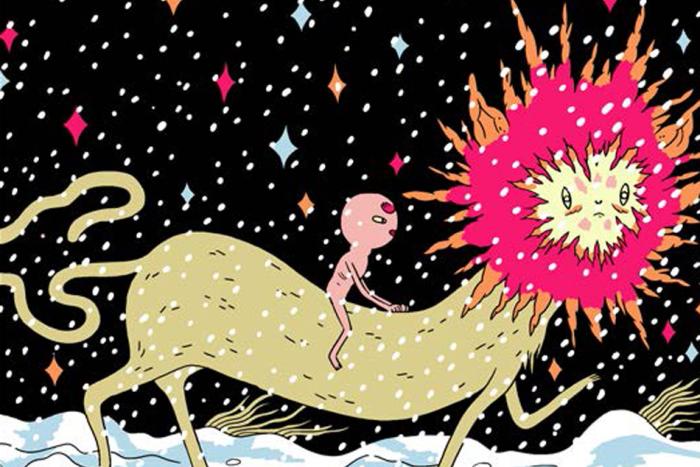Even among the panoply of weirdos that is The Kids in the Hall, Bruce McCulloch is maybe the weirdest. He’s the smallest, certainly, and the angriest. The most physically funny, too (though Kevin McDonald might object). He made the least attractive woman and the most convincing autistic child. For a good encapsulation of McCulloch’s role in The Kids in the Hall—and maybe McCulloch in general—watch the eight-minute German-impressionist style sketch “Love and Sausages.” It’s an excessively long, overcommitted, and utterly indispensible bit of comedy for which he burned up a good chunk of that season’s budget and shooting time. “Bruce, who’s manipulative at the best of times, turned on his backchannel ‘I’m gonna talk to Cindy [Park, a Kids producer],’ stuff,” remembers Mark McKinney of the shoot in an interview with Nerdist’s Chris Hardwick. More to the point: McKinney said this with McCulloch sitting right next to him.
McCulloch’s response? To giggle with glee.
He has been described by other members of the troupe as the most tyrannical, the least patient, the most brilliant, and the hardest to pin down. Each Kid is past 50 now, and each seems to have become more attuned with himself as he ages: McKinney acts and produces in Canada, Dave Foley is a performer and standup in Los Angeles, McDonald acts and writes while quietly enjoying life in Winnipeg, and Scott Thompson’s charm affords him both correspondent and reality show roles with ease. They are all still weird, but it’s a weird they’ve grown into, and it’s a brand of weird that pales in comparison—and is a definite grandparent to—the deconstructionist weirdness that comedy has crashed towards since (like, say, Tim and Eric, or Comedy Bang! Bang!).
McCulloch is harder to qualify, it seems. His success behind the camera notwithstanding, he’s slippery. And defiant in his slipperiness, too, an operating position that makes total sense when you know he started his creative life as a punk rocker. To not only defy categorization, but to thumb your nose at it, is a particularly punk rock pose. While the other Kids seem happy to ride the industry train when and if it permits them, McCulloch appears to want to kick through it. He is largely disinterested in doing it on anyone else’s terms.
And yet—even as that is true, it’s also a misnomer. There’s a lot of normal in that weird. He directed Superstar with Molly Shannon and Will Ferrell, as well as Dog Park and Stealing Harvard. He spends his days writing and pitching TV and film ideas to rooms full of suits in LA. And he still, like many of the other Kids, does one-man shows. He released a book about his life, Let’s Start a Riot, this past October that’s weird but could have been much weirder, even when it dips its toe in some striking darkness—his father’s alcoholism, mainly. (It also makes his wife and kids seem like the cast of a Wes Anderson film written by…well, Bruce McCulloch.)
And here’s the most ordinary thing of all: a TV show, called Young Drunk Punk, after McCulloch’s early years as a Calgary ne’er-do-well roaming the streets in the late ‘70s and early ‘80s and premiering on City TV on January 21. It’s a sitcom created, written by, and directed by McCulloch, with he and his real-life wife playing a version of his own parents. Pretty weird, right? But a kind of weird approaching normal, at least a normal Brucio can get behind. One you might giggle gleefully at.
*
You’re in Calgary working on the show, yes? How’s it going?
We’ve done about nine episodes—we’re just sort of in the home stretch—and it’s been great. We shoot in the old townhouse community in Calgary that I grew up in.
Oh really! So you’re able to do it right there?
Yeah. Or we have to do it right there, depending on how you look at it.
I want to talk to you a bit about the intersect between making your story into a book, a stage show, and a TV show in turn. How do you take one story—which is your story, obviously—and make it work within these different genres?
Well, I mean, they’re all different of course, but they’re all similar in that you’re taking an idea and following it. Whether you’re writing characters that are exploring that idea or you’re just telling a story about yourself. All of this clay is much different but similar, of course. Ahhhh!
[We are talking on the phone. McCulloch has fallen, or tripped, or experienced something physical, and he has screamed into the phone. It’s the funniest, highest pitched noise I’ve ever heard. I saved it and I listen to it when I am sad.]
Are you okay?
I’m okay. Are you okay?
I’m fine.
You’re good!
I always just say I follow the water—whatever the idea is. That’s how I know if it’s good for a stage show. But if it feels too precious to go onstage, or too tentative, or too, you know, lyrical, it may become a book. And if it’s people running around having fun, it may be a TV series. So it’s kind of the same clay, and I just sort of watch where they go for every genre, as you call it.
How do you go about turning autobiography into something as specific as a sitcom? How far are you deviating from your own story in creating this show?
When I did Young Drunk Punk on stage, people came and said, “You know, this would actually make a good book.” And other people said, “This would be a good show.” The thing about it is that the TV series is very different than my personal story. It’s only kind of what I vaguely remember about growing up in Calgary, and the comic possibilities are either ones I was able to remember or, in some cases, ones I made up. And it’s a very specific thing, which is two young guys and their families, in 1980, who don’t understand the world. That is a certain sliver of what’s in the book, so I followed it and created a bunch of characters, myself included as the father, who are reflective of the conversation of growing up and finding one’s place. With the book, it’s more literally my story. The TV show is figuratively my story.
You said that some of Young Drunk Punk is made up and some of it is stories you think you remember—but how easy is it for you emotionally or actually to access that part of your life, given where you’ve gone since then?
Well, I think it’s fun. In a way, as artists we’re our own most precious resource. The things that happened to me, or I think about, or I observed, tend to be my strongest stuff. I don’t think it’s hard. I’ve always, whether with one-man shows or with The Kids in the Hall stuff I did, based it on me. Even though much of it was surreal, a lot of it was based on a fight I was having with my girlfriend, or my mom having a heart attack. Whatever it is, you turn it comically. So, when it’s more specific, like when I remember getting into a fight and kissing a cowboy, it’s fun to be able to look and go, a) what a little weirdo I was, and b) there’s a story there.
With the book, specifically, there are some rather dark aspects to your background and your story. Is there some catharsis to dealing with this stuff comically now? And are you learning anything new about yourself?
I’ve always dined out on what a drunk dad I had. But I think the part of the book that was fresh for me was realizing that even though I crawled out of a shitty family, as many of us did, I could create a better one of my own. And that of course is The Kids in the Hall, but even more the family I have today. My family.
You said you started with the stage show first. What inspired you to bring your youth to the stage? This specific topic: the young drunk punk.
I’m obsessed with a lot of things. I’ve been obsessed with the notion of outsiders and how people your age or younger still don’t know how to fit in, as I didn’t know how to fit in when I was young. As I still don’t know how to fit in as an older guy. And I began to see the connection, a little bit in the book but moreso in the show, which is that we are all outsiders. We’re all in this together. I think that sort of drove me to want to be onstage a bit more. The work we’d done recently with The Kids in the Hall kind of inspired me, and I wanted to connect directly with all the weirdos I’d grown up with, or who’d grown up with me, or new ones, in a way other than sitting in my house alone. More than you get to do with movies or TV shows or something like that.
I’m also a Canadian living in the US, doing comedy writing, so the thing I think about a lot is how I still very much feel like an outsider being a Canadian kid here, inasmuch as I felt like an outsider growing up being the weird one in my school. Do you feel like you can access that, being the Canadian in the US?
Oh, yeah. I never feel like more of an outsider than when I walk into NBC to sell a show to 11 executives. They think I’m hilarious and their buddy, and often they’re interested in what I have to say, and often they buy it, but I feel like I’m not like them. And we all feel like we’re not like them, a lot in life. The Kids in the Hall can fill a 7,500-seat theatre with people who want to connect with these notions. So, there are a few of us.
I’ve heard you talk about your punk rock background before in interviews, and how much music meant to you when you were a kid. I have a theory that punk rock and sketch comedy share some similar DNA. Can you speak to that a little bit?
Yeah, I think they’re the same disenfranchised (mostly) guys sitting in their basements with nothing to do. It usually starts [with something] about girls. And what do you do all day? I’m glad there wasn’t crystal meth when I was growing up. I mean, I don’t do drugs but something has to take you away. I think there’s something about viewing the world that is certainly in common with comedy and punk music that starts within that.
Like you say, you write a lot of TV, you’re a director, obviously, and a comedian as well. You still do a lot of stage work, etc. So how does your approach to each of these pursuits differ?
Well, it’s fastball, curveball. You do one thing for a while, and then you want to do another thing. We’re in the middle of making TV right now, and the part of my brain where I created all the lines is kind of quiet. But the technician part of me is rising up. It’s just different tasks. It’s not like I’m doing a film where I’m playing a soldier in WWI—I wouldn’t know how to do that. It’s all my weird observations, whether they be on stage, whether they be a cutaway to some weird guys that I cast—it’s all following my observations. So it’s always the same things I’m thinking: is this cool, did this ring true, did this interest me?
In the book it’s about a 50/50 split between writing about your current life—your wife, your kids—and your life growing up. Decidedly, the writing about your wife and kids is very light, funny, it’s a little absurd, whereas the writing about your growing up, while still absurd—which is obviously part of your voice—is a little bit darker, a little more incisive, a little more cutting. How much do you think your work in general comes out of the space between those two places?
That’s where I live, is between those things. For me, I never really think anything’s really dark. I don’t think of Cancer Boy as dark. I mean, even talking about the death of my father—that’s not dark, it’s human. I think it’s all human. I’ve never been in a tough situation where laughter couldn’t get me through. When it’s bleakest, I usually do [laugh]. I think my selfish guy job is to have a weekend be the bad sex weekend, or getting the ashes of my father on my face, or just feeling like a fucking loser. We have to have a little sense of humour or absurdity about all of it. And I don’t know, maybe it’s just my personal style.
Is that coming up in the TV show you think? Tonally, where does the show sit?
It’s real characters, but they drive themselves to weird situations. And I’ve always been obsessed with characters who get themselves into trouble. Which is certainly what Tim [Carlson, who plays Ian, aka Young Bruce] and Atticus [Mitchell, Ian’s bestie]’s characters do. Yeah, I think I like a little bit of silliness. I did a vehicle with Ray Liotta [2006’s Comeback Season], and nothing was absurd in it and afterwards I was like, “That was okay, but I would have liked the odd little weird thing.” So I think it’s grounded, but we try to have as much fun as we can.
Finally, is this a good time to be Bruce McCulloch?
It’s fantastic but I’m also tired of myself. I’m tired of asking myself what I think of things. And what I used to be like when I was 17, or what it was like trying to get tickets for The Clash. But I got into this to make stuff. To write a book that people respond to, or be on stage. I didn’t get into this to write a film for Paramount, that I get paid well for but then it doesn’t happen. So, I’m really making a lot more stuff, and that’s pretty great.






